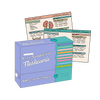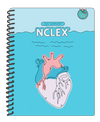THE NCLEX LOVES THESE TOPICS…
The NCLEX tends to follow certain topics and incorporate “must-know” signs & symptoms, side effects, medications, and nursing interventions. Part 3 is here to give you that jump-start on your studying and a checklist to be sure you know these. I’ll give you 5 topics for every category, and you can build from there. Remember, you have the knowledge. You’ve learned this. It’s simply about channeling it, focusing on the core concepts, and understanding how it connects.
🧪 Labs:
🧠 Neuro:
- Normal ICP = 10-15 mmHg
-
Cushing’s Triad
increased systolic BP, bradycardia, altered breathing patterns (late sign of increased ICP)
- Suspected bacterial meningitis = place on droplet precautions immediately
- Sudden vomiting without nausea = concern for increased ICP
- Know Glasgow Coma Scale Scoring! (15 is BEST!)
🫁 Respiratory:
- COPD is an umbrella term for two main diagnoses: ⤵
- Emphysema (“Pink Puffers”)
- Chronic Bronchitis (“Blue Bloaters”)
- Know best breathing techniques for each :)
- Chest tubes
- Constant bubbling = BAD
- Intermittent bubbling = GOOD
- Know the difference between dry and wet suction
- Cystic Fibrosis
- Autosomal recessive genetic disease
- Chest physiotherapy should not be done close to meal time
- Diet: increase calories, increase fat, increase fluids
- Pancreatic enzymes should be sprinkled on an acidic food (applesauce)
-
Incentive spirometer use
Breathe all existing air in the lungs OUT, and then place mouth on mouthpiece and INHALE to expand the lungs
Most questions are focused on patient education, so review use and teaching points.
- Know expected ranges
- SpO2 95-100% (non-COPD patients)
- COPD patients will naturally run lower at baseline
- Respiratory rate (12-20 breaths/min) → Know medications which can alter this!
(Ex: Opioids = respiratory depression)
🫀 Cardiac:
- Cardiac arrhythmias & identification of EKG changes
-
Antihypertensive medications & patient education
(Ex: ACE inhibitors: Monitor for dry cough, angioedema, and elevated K+ levels)
- Heart failure
- Left vs right-sided
- Commonly used medications: furosemide & other diuretics, antihypertensives
- Interventions: fluid restriction, daily weights
- Orthostatic hypotension
- Causes
- Patient Education
- Digoxin
- Signs of digoxin toxicity (vision changes or “halos”)
- Therapeutic Range
🍽️ GI:
-
Appendicitis
Signs: Rebound tenderness at McBurney’s Point & Rovsing’s Sign
-
Pancreatitis
Signs: Cullen’s sign, Grey Turner Sign
- Causes
- Acute vs. Chronic
- Ulcerative Colitis vs. Crohn’s Disease
- NG tubes
- Placement & nursing skills
- Use
- Normal vs. abnormal output
-
Liver failure & cirrhosis
Use of lactulose in liver cirrhosis
- Signs of hyperalbuminemia
- Signs of liver failure (jaundice, weight loss, ascites)
🫘 Renal/urinary:
- AKI vs. CKD
- Post-streptococcal glomerulonephritis
- Prevention & treatment
- Types of dialysis and assessment of access sites
(fistulas, bruit vs. thrill) - Urinary tract infections
- Signs & symptoms
- Treatment
- Diagnosis
- Patient education on proper hygiene & hydration
-
Know expected values:
The NCLEX focuses heavily on expected ranges!
- Urine output less than 30mL/hour = notify HCP
- Importance of specific gravity
🧠 Mental Health:
- Therapeutic communication
-
Manic phase of bipolar disorder
Nutrition & hydration: small, handheld high calorie/high protein snacks (hamburger, granola bars, etc.)
- MAOIs
- Tyramine restriction & drug/drug interactions
- Dementia vs. Delirium
- Safety precautions & priorities
These are only some of the key points you should keep at the forefront of your brain as you enter exam day. Remember, you’ve learned this, it’s simply gauging what is most commonly tested on and what major topics need to be grasped and understood.
Know that with the knowledge of core concepts and how the body systems work, you’ll grasp everything with more ease. Find more NCLEX must-knows, practice questions, a study planner, and an NCLEX crash course of question formats in the NCLEX Study Notebook.
Happy exams, future nurses. You’re almost there!
<3 Kristine














